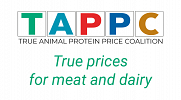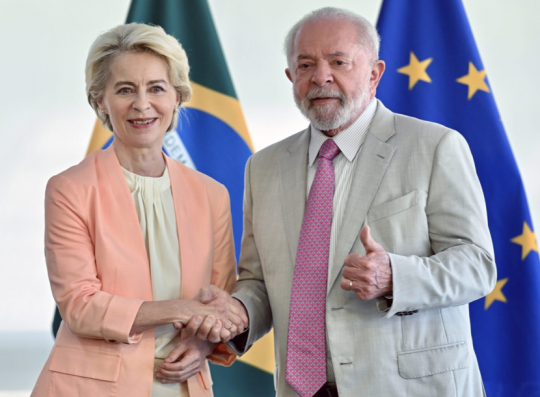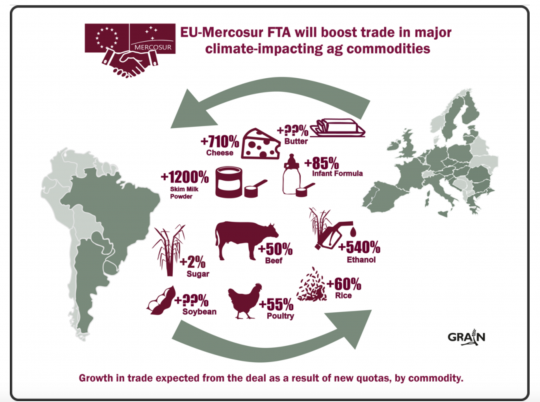EU trade policy on a collision course with climate policies
Today, in an open letter, TAPP Coalition warned EU Commissioner Frans Timmermans and his team about two examples of EU trade policy on a collision course with climate policies, leading to disbelieve, anger and hate towards EU institutions. TAPP Coalition proposed alternatives that are more helpful.
In December 2023, a trade mission with the EU Agri Commissioner will visit India to seduce India to eat more meat and dairy and drink more alcohol products like beer and wine. This EU trade mission will increase GHG-emissions from diets in India. India now has diets almost without meat (only 5 kg meat consumption per capita compared to circa 70 kg meat per capita in the EU). The EU trade mission is undermining the EU and global climate policies based on the Paris Climate Agreement.
Another example of harmful trade deals was found last week when European Commission President Ursula von der Leyen visited Latin America and was vowing in Brazil that the EU and Mercosur will sign their major, long-delayed trade agreement “the latest by the end of the year.” However this trade deal will lead to huge exports of cheap South American beef towards the EU, increasing GHG-emissions and continued Amazon forest destruction.
The agreement with the Mercosur bloc (Brazil, Argentina, Uruguay and Paraguay) would be Europe’s biggest and is projected to increase trade by the billions, since it cuts tariffs such as Mercosur’s 35 percent for cars and 27 percent for wine, and Europe’s (roughly) 40 percent for beef.
Speaking alongside Brazil’s President Luiz Inácio Lula da Silva, von der Leyen said Brussels is “looking forward” to agreeing a sustainability addendum — a document that Brussels wants to negotiate on top of the trade deal. The aim of this is to ensure the increased trade with South America doesn’t lead to more deforestation in the Amazon, which it obviously would otherwise (and almost definitely will anyway) because most Amazon deforestation is linked to the beef industry.
Background
Brussels has been pushing for the addendum since it became clear that a number of EU countries including France and Austria would block ratification of the deal unless it has better protections for the environment.
But during a press conference 12th June, Brazil’s President Lula said he was concerned that the extra protocol could add obligations that may lead to sanctions if not respected. “The premise that should exist between strategic partners should be mutual confidence and not mistrust or sanctions,” Lula warned.
Agri protectionism
But von der Leyen will have to circumnavigate the EU’s own problems with the trade agreement as well in order to get it over the line. While Spain, Portugal, Germany and free-trade-minded countries like the Nordics want to conclude this deal fast, France, Austria and Ireland have sought to delay the deal, not just for environmental reasons, but also due to good old-fashioned agricultural protectionism. Recently, even the Dutch parliament called on its government to oppose the deal if it leads to increased competition for farmers.
The new EU-Mercosur trade deal will raise greenhouse gas emissions from trade in just eight farm products by one-third. Research from GRAIN, released 2,5 years ago, shows that the trade pact will boost climate emissions for eight farm products by 8.7 million tonnes per year, one-third more than was produced in 2019. More than 80% of these emissions will come from one product: Mercosur beef. On Europe’s side, emissions from the export of dairy products will rise by 500%.
TAPP Coalition letter to Frans Timmermans
TAPP Coalition and some of the Coalition business partners warned EU Commissioner Frans Timmermans and his team and Members of EU Parliament and the Dutch Parliament about the controversial future trade deals. TAPP Coalition shared its concerns also with newspapers like the Guardian.
TAPP Coalition wrote: "If the EU wants to be credible on zero deforestation and climate policies the Mercosur deal on importing more beef from South America should be stopped immediately. This is absurd and ridiculous. We need higher EU import taxes on beef, chicken, soy from South
America to protect the climate and the South American forests, but the EU is doing the exact opposite. We need CBAM import tax constructions to protect EU farmers from cheap imports from countries with nearly no climate policies and non-effective biodiversity laws like in South America. A recent article in the Guardian showed that illegal beef products from Brazil still find its way towards Europe on a massive scale. EU and Brazilian forest protection laws don't work to prevent this practice. Does the EU really want to reward Brazil and Argentina for what they did last 10 years to block all references and calls for low climate diets and more plant based diets in IPPC reports and other UN climate agreements? See this article revealing the destructive role of those countries. People will hate the EU for making an EU-MERCOSUR deal with Brazil and Argentina and loose faith in institutions and political leaders".
TAPP Coalition wrote about the trade mission to India: "India now has a very climate-friendly and low-alcohol diet, without much meat, dairy and alcohol consumption. Is this what the EU should do to ask Indians to eat more meat and dairy, when worldwide climate goals must be achieved ? Can the EU instead better support exports towards India from European food producers of meat and dairy substitutes such as Vegetarian Butcher, Beyond Meat, Vivera, Quorn, Oatly, Upfield, with a minimal impact on health and climate? Can it still be decided that the European meat and dairy producers are excluded to the Indian trade mission to promote their climate damaging products? The EU Agri food delegation in India can work on common climate policies and long term food security diplomacy instead, for example how can the EU and India ensure that world meat consumption decreases instead?
FAO projects global livestock units (meat/dairy production) will grow with 145% by 2050 compared to 2012 (Business as usual; in a sustainability scenario the growth still will be 126%). This will be devastating for realising the 1,5-2 Degrees Paris Climate Goals. The EU and India and other countries can work together on a Governance Agreement on Meat and Climate Change (GAME CCHANGE), see draft in the attachment. In this agreement high income countries can agree to move towards the average global consumption of 42 kg meat per capita per year by 2040.
Fiscal instruments are most suitable for this, just like fiscal instruments significantly reduced fossil energy consumption, and where tax revenues are used to subsidize climate-friendly alternatives. A levy on meat and dairy or ETS systems for meat/dairy companies generate income that can be used to help farmers to produce in a climate-friendly way and help consumers to consume in a climate-friendly way. Last week the EU Commission DG Clima presented a first draft report on a new ETS system for agriculture. Young Farmer organisation CEJA and TAPP Coalition agreed that dairy companies, slaughterhouses and meat/dairy importing companies should be part of this new ETS regulation, not farmers. We hope the EU Commission can develop such an important scheme, since agriculture and food are the last sectors in the EU not part of any CO2 eq pricing scheme.



